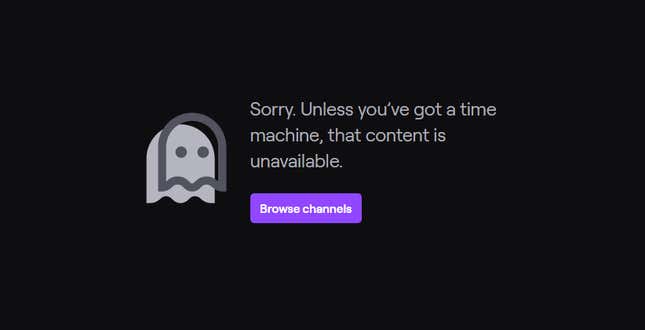
Today, Twitch announced a “significant” update to its harassment and hateful conduct policies. The update takes aim at multiple blind spots in Twitch’s previous rules, adding clearer language about membership in hate groups, symbols like the Confederate flag, and sexual harassment.
In a blog post, Twitch outlined the impending changes, which will go into effect on January 22. They’ll run the gamut from concrete, explicit rules about hate groups and symbols (they’re banned) to broader philosophical shifts. Twitch opened its post with what it seems to consider the biggest change:
“Words and actions have meaning and impact, even if your intent is not meant to be hurtful or cause harm,” wrote Twitch. “And even if the target of your behavior or comments isn’t bothered by them, others in the community may nevertheless feel impacted by it. Under the new policy, our Safety team will look at the content of statements or actions in order to determine whether a behavior is abusive and violates our guidelines, rather than relying solely on perceived intent.”
So basically, even if you’re not necessarily trying to harm or antagonize someone, if your actions ultimately result in a negative outcome, you can still face consequences.
The new rules also more explicitly forbid many behaviors that could be considered harassment or hateful conduct. These include:
- Claiming that the victim of a well-documented violent tragedy is a “crisis actor” or lying
- Encouraging others to DDoS, hack, doxx, or swat another person
- Inciting malicious raids of another person’s social media profiles off Twitch
- Hate groups and hate group propaganda
- The Confederate flag (on account of its “historic and symbolic association with slavery and white supremacist groups in the US”)
- Malicious emote combinations
- Attacks rooted in caste, color, or immigration status
- Black/brown/yellow/redface “unless they are being used in an explicitly educational context”
Twitch has also given sexual harassment its own separate section within the new rules, acknowledging that in the previous rules “our guidelines didn’t adequately account for harassing behaviors that are sexual in nature.” Beginning in January, there will be a “much lower tolerance for objectifying or harassing behavior.” Twitch provided examples of behaviors that will now be considered sexual harassment:
- Repeatedly commenting on someone’s attractiveness, “even in what you believe to be a positive or complimentary manner... if there is indication that it’s unwelcome (i.e. you’ve been asked to stop, timed-out, or channel-banned)”
- Making lewd or explicit comments about anyone’s sexuality or physical appearance
- Sending unwanted/unsolicited links to nude images or videos
Twitch also intends on changing how it enforces these rules, with the goal of better aligning punishments with their corresponding crimes.
“This iteration of our guidelines is also much more detailed, with enforcements tailored to the severity of the action or language,” Twitch wrote. “As a result, behaviors that are relatively low in severity, or language commonly viewed as being colloquial, will receive warnings or lighter suspensions, while more malicious or overtly harmful behaviors and language will receive stricter penalties—the most severe violations will continue to receive an indefinite suspension on the first offense. In total, we expect that the penalties under this iteration of the policy will scale more appropriately to the severity of the violative behavior.”
Of course, making rules is only part of the equation. Twitch has struggled to consistently enforce its own rules for nearly as long as it’s existed. That’s where it needs to improve the most. Come January, we’ll find out if Twitch really means what it says, or if different rules still apply to different streamers.

